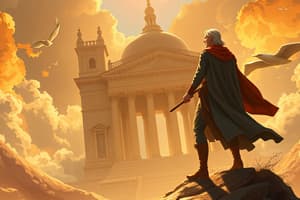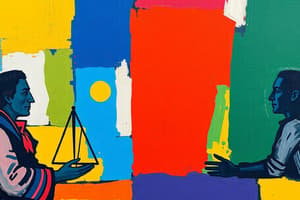Podcast
Questions and Answers
What does Liberty and Order - 1.A.1 refer to?
What does Liberty and Order - 1.A.1 refer to?
- Ideas of limited government (correct)
- Political parties
- Natural disasters
- Economic powers
What is limited government?
What is limited government?
The government powers are restricted and limited by the laws.
What are natural rights?
What are natural rights?
Rights that are inherent, believed to be God-given.
Which philosopher's theory of natural rights most strongly influenced America's foundational documents?
Which philosopher's theory of natural rights most strongly influenced America's foundational documents?
What are some examples of natural rights theory expressed in America's foundational documents?
What are some examples of natural rights theory expressed in America's foundational documents?
Define popular sovereignty.
Define popular sovereignty.
Define republicanism as envisioned by the founding generation in America.
Define republicanism as envisioned by the founding generation in America.
What is the social contract?
What is the social contract?
How is social contract reflected in America's foundational documents?
How is social contract reflected in America's foundational documents?
How does the Declaration of Independence provide a foundation for popular sovereignty?
How does the Declaration of Independence provide a foundation for popular sovereignty?
Briefly explain 'no taxation without representation'.
Briefly explain 'no taxation without representation'.
Who authored the Declaration of Independence?
Who authored the Declaration of Independence?
Flashcards are hidden until you start studying
Study Notes
Liberty and Order in the US Government
- US government is rooted in principles of limited government: restrictions on power defined by laws.
- Constitution delineates powers of government, specifying what it can and cannot do.
Limited Government
- Government's power is restricted by law.
- Essential to maintaining individual liberties as outlined in the Constitution.
Natural Rights
- Inherent rights believed to be universal; often termed "God-given rights."
- Emphasizes the need for limited government intervention to protect these rights.
- Influenced heavily by John Locke's philosophy during the Enlightenment.
John Locke's Influence
- Locke defined natural rights as "life, liberty, and estate (property)."
- His theories significantly shaped America's foundational documents.
Examples of Natural Rights in Foundational Documents
- Declaration of Independence articulates "Unalienable rights to life, liberty, and the pursuit of happiness."
- Preamble of the Constitution reinforces the purpose of establishing justice and securing liberty.
Popular Sovereignty
- Concept that ultimate authority lies with the people, or "democracy" in Greek.
- Constitution opens with "We the People," highlighting that the government derives its power from the people.
Republicanism
- Represents a government where the will of citizens is reflected in government duties.
- Citizens are represented; they rule indirectly through elected officials.
- Constitutional "Guarantee Clause" ensures states maintain a republican form of government.
Social Contract
- An agreement supporting the notion that governments derive authority from the consent of the governed.
- Stipulates that individuals give up some freedoms in exchange for protection of natural rights by the government.
- Theorizes that if a government fails its duties, the people have the right to alter or abolish it.
Social Contract in America's Foundational Documents
- Declaration of Independence states that government's powers come from the consent of the governed.
- Asserts the right of the people to change or abolish a destructive government structure.
Popular Sovereignty and the Declaration of Independence
- Declaration articulates reasons for breaking from British governance, emphasizing lack of representation.
- Colonists argue against British taxation, marking a pivotal grievance leading to revolution.
"No Taxation Without Representation"
- Conflict arose as British imposed taxes without colonial representation.
- Led to increasing tensions, ultimately culminating in revolutionary sentiment and the Declaration of Independence.
Authorship of the Declaration of Independence
- Primarily authored by Thomas Jefferson, with contributions from Benjamin Franklin and John Adams.
Studying That Suits You
Use AI to generate personalized quizzes and flashcards to suit your learning preferences.




